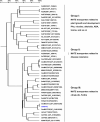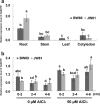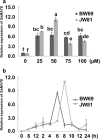GsMATE encoding a multidrug and toxic compound extrusion transporter enhances aluminum tolerance in Arabidopsis thaliana
- PMID: 30268093
- PMCID: PMC6162897
- DOI: 10.1186/s12870-018-1397-z
GsMATE encoding a multidrug and toxic compound extrusion transporter enhances aluminum tolerance in Arabidopsis thaliana
Abstract
Background: Multidrug and toxic compound extrusion (MATE) transporters, which exist widely in plants, function as crucial regulators in plant resistance to aluminum (Al) toxicity by inducing citrate efflux. However, the functions of most MATE family members in soybean (Glycine soja) remain to be elucidated.
Results: Expression pattern analysis showed that GsMATE was constitutively expressed in different soybean organs, with the highest level in root compared with those in stem, leaf and cotyledon. In addition, Al stress induced expression of GsMATE in soybean. Temporal analysis indicated that GsMATE expression was greatly enhanced by increasing concentrations of aluminum [Al3+] after short exposure, reaching the high levels detected in the BW69 (Al-resistant) and the JW81 (Al-sensitive) lines of Glycine soja of wild soybean at 6 h and 8 h, respectively. Furthermore, transient GsMATE expression in Arabidopsis protoplasts showed that GsMATE protein localized to the plasma membrane. Overexpression of GsMATE on an Arabidopsis columbia-0 (Col-0) background resulted in increased Al tolerance in transgenic plants. Analysis of hematoxylin staining showed that the roots of GsMATE transgenic lines were stained less intensely than those of the wild-type exposured to the same AlCl3 concentrations. Therefore, GsMATE enhanced the resistance of transgenic plants to Al toxicity by reducing Al accumulation in Arabidopsis roots.
Conclusions: In summary, our results indicate that GsMATE is responsive to aluminum stress and may participate in the regulation of sensitivity to Al toxicity in Arabidopsis. In addition, the GsMATE protein is an Al-induced citrate transporter of the MATE family and exerts an essential role in Al tolerance in Glycine soja.
Keywords: Al tolerance; Arabidopsis thaliana; Glycine soja; GsMATE.
Conflict of interest statement
Ethics approval and consent to participate
Not applicable.
Consent for publication
Not applicable.
Competing interests
The authors declare that they have no competing interests.
Publisher’s Note
Springer Nature remains neutral with regard to jurisdictional claims in published maps and institutional affiliations.
Figures





References
-
- Chen Q, et al. Transcriptional and physiological changes of alfalfa in response to aluminium stress. J Agric Sci. 2011;149:737–751. doi: 10.1017/S0021859611000256. - DOI
MeSH terms
Substances
Grants and funding
- 31771816/the National Natural Sciences Foundation of China
- 31371642/the National Natural Sciences Foundation of China
- 30971814/the National Natural Sciences Foundation of China
- 2016ZX08004002-007/the Major Projects of New Varieties Cultivation of Genetically Modified Organisms
- CARS-04-PS09/the China Agricultural Research System
LinkOut - more resources
Full Text Sources

